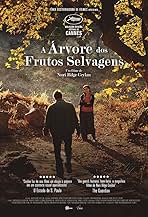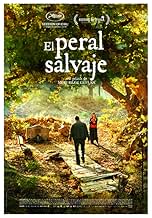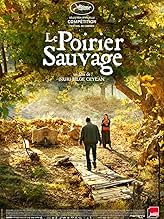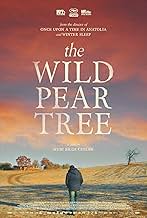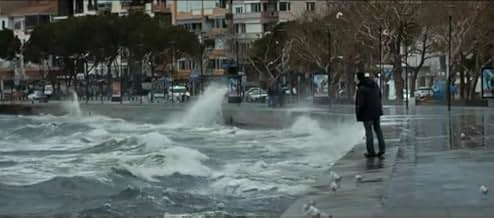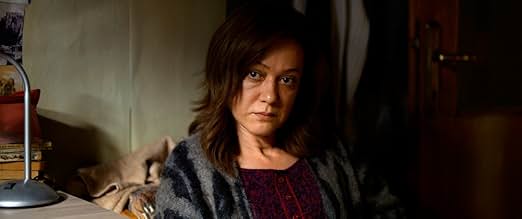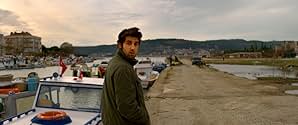Un aspirante scrittore fa ritorno al suo paese natale, dove i debiti di suo padre si riversano su di lui.Un aspirante scrittore fa ritorno al suo paese natale, dove i debiti di suo padre si riversano su di lui.Un aspirante scrittore fa ritorno al suo paese natale, dove i debiti di suo padre si riversano su di lui.
- Regia
- Sceneggiatura
- Star
- Premi
- 10 vittorie e 15 candidature totali
- Sinan Karasu
- (as Aydin Doğu Demirkol)
- Yasemin Karasu
- (as Asena Keskinci)
Recensioni in evidenza
This witty and beautiful film is full of metaphors, wonderful imagery and deep, intriguing conversations. The film revolves around many interesting themes. Among these themes is that ruptures in the soul should be treated with joy and patience for they help us discover who we are. The cinematography is luminous, mesmerizing and far ranging from lamp lit streets at night, rainfall and close-ups of Hatice's flowing hair. I want to linger in each place. It is a long film, but for what it reveals about contemporary Turkish society and human nature, it is a fantastic bargain and worth the price. From the director of Winter Sleep and Once Upon a Time in Anatolia. Seen at the 2018 Toronto International Film Festival.
Long because it's, well, long (clocking in at just over three hours). But also long because the main character, who's in virtually every frame of the movie, is such an unpleasant person to hang out with. And part of the reason that he's so unpleasant is that he's recognizable, as I've been that person myself. He's young, fresh out of college, and thinks he knows everything there is to know about life despite having almost no experience of it himself. He's cocky, condescending, and unbearable. What ultimately makes him worth spending time with, and for that matter makes the whole movie worth sticking with, is the final scene, in which he comes to understand that the father who he's shunned because of all the life mistakes he's so determined not to make himself is perhaps the one person in his life who most understands him and most emulates the ideals the son goes around shoving down everyone's throat.
This is the kind of movie I wish I had seen with someone else so I could have someone to talk about it with. Throughout the film, the protagonist has little moments of.....I'm not sure what to call them.....daydreams? hallucinations? A scene will play out one way, and the it will abruptly shift gears and play out another, leading us to believe that the first version was in the protagonist's head. I'm not sure what to make of these breaks from reality. He's written a book that he's trying to get published, so maybe these episodes are a glimpse into how events play out in his book rather than how they did in reality? Or maybe it's the reverse. Maybe the movie we're watching is the book he wrote, and these moments are what actually happened. Or maybe it's neither and I'm overthinking. Maybe he's just a writer who is always attuned to alternative paths a person's narrative might take.
The ending didn't exactly make me feel like all of the three hours preceding it were necessarily worth it. I don't know why the movie had to be quite so long. But it did linger in my head and it's made the whole movie grow in stature for me when I think back on it. I don't know that I'd want to watch it again, but I'm glad I watched it once.
Grade: A
Lo sapevi?
- QuizAccording to Nuri Bilge Ceylan, The Wild Pear Tree is about a son's unavoidable slide towards a fate resembling that of his father.
- Citazioni
Sinan Karasu: When we learn we are not so important why is our instinct to be hurt? Wouldn't it be better to treat it as a key moment of insight? We engender our own beliefs. Thus we need to believe in separation as much as in beauty and love, and to be prepared. Because rupture and separation in wait for everything beautiful. In which case, why not treat these tribulations as constructive disasters that help us pierce our own mysteries.
- ConnessioniFeatures Umutsuzlar (1971)
- Colonne sonorePassacaglia and Fugue in C minor, BWV 582
Composed by Johann Sebastian Bach
Performed by Leopold Stokowski
I più visti
- How long is The Wild Pear Tree?Powered by Alexa
Dettagli
- Data di uscita
- Paesi di origine
- Siti ufficiali
- Lingua
- Celebre anche come
- The Wild Pear Tree
- Luoghi delle riprese
- Yenice, Çanakkale, Turchia(location)
- Aziende produttrici
- Vedi altri crediti dell’azienda su IMDbPro
Botteghino
- Lordo Stati Uniti e Canada
- 34.014 USD
- Fine settimana di apertura Stati Uniti e Canada
- 4923 USD
- 3 feb 2019
- Lordo in tutto il mondo
- 1.696.258 USD
- Tempo di esecuzione3 ore 8 minuti
- Colore
- Mix di suoni
- Proporzioni
- 2.39 : 1
Contribuisci a questa pagina



